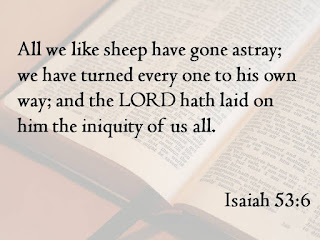The Wounded Healer
As Christians, we don't like to dwell on the idea of suffering. In fact, as thinkers and writers like Donald Miller have pointed out, sometimes we lead people astray because we give the impression that suffering ends at the moment of conversion. That's obviously not true, but it creates a false narrative for the world.
I contend that the biggest struggle for Christians and non-Christians alike is to reconcile our idea of a loving and benevolent God with the suffering in the world. There's been countless songs, movies, stories, and poems from people trying to work that out.
A couple weeks ago in Faith in Film, we looked at the movie "Tree of Life." It's not a great movie to sit and watch, or an easy watch, but what fascinates me is that you feel the writer/director, Terrance Malick, trying to work out the question and faltering. Through the point-of-view of Jack as a boy (the character that best represents Malick) you hear this question of God, "Why should I be good when you aren't?"
That's heartbreaking and incorrect, but it comes from a place of misunderstanding. Most Christians just gloss over the root cause of suffering because they don't understand it themselves or don't want to talk about it. God didn't create suffering, the fallen nature of man did. This is something that even non-believers can sometimes grasp.
"Watchmen" is about as dark a narrative as you can find. It comes from an atheistic, anarchistic point-of-view. It's dark and presents the world as broken and largely hopeless. But it does correctly attribute the cause of brokeness and suffering. One of the "heroes," Rorschach, is being questioned by a doctor about why he took the law into his own hands. He tells a dark story of a search for a missing girl, and finding her dead at the hands of a disturbed individual. In response to the doctor he says, "You see, Doctor, God didn't kill that little girl. Fate didn't butcher her and destiny didn't feed her to those dogs. If God saw what any of us did that night he didn't seem to mind. From then on I knew... God doesn't make the world this way. We do."
That's a dark take, but it puts the blame on the fall of man. In a more eloquent way, Francis Schaeffer does the same thing in his fascinating book "He is there and He is not Silent." In his, Schaeffer says, “Man, made in the image of God and not programmed, turned by choice from his proper integration point at a certain time in history. When he did this, man became something that he previously was not, and the dilemma of man became a true moral problem rather than merely a metaphysical one. Man, at a certain point in history, changed himself, and hence stand, in his cruelty, in discontinuity with what he was.” In other words, the Garden of Eden changed everything. God didn’t make the world this way, we did.
In fact, we should celebrate as believers because the only man who didn't give in to the fallen nature of the world — Jesus — endured immense suffering meant for us so that we wouldn't have to. That's what we see in the prophesies in Isaiah, spoken to a people enduring trials. Those words gave them hope — and give us hope today — because we know we have a Savior in Jesus who has known great suffering and can empathize with us.
Henri Nouwen talks about this in his book, "The Wounded Healer." As Christians, we're perfectly positioned to be a leading voice on suffering if we answer that call. He says in the book, “The great illusion of leadership is to think that man can be led out of the desert by someone who has never been there.” We worship a God who's spent plenty of time in that desert, and we're a people that know that desert, too. Platitudes and pretense isn't the way to help others caught in that same desert.
Jesus suffered for us all, and if we're His people, we won't be afraid to suffer with others. As we sing in Hosanna, "Break my heart for what breaks Yours." Let that be the earnest cry of our hearts as we meet a broken, suffering world on their terms and point them to the light of hope.




Comments
Post a Comment